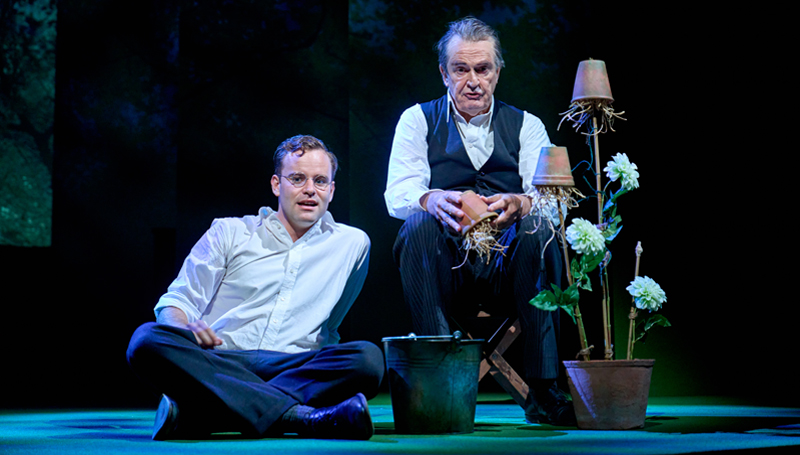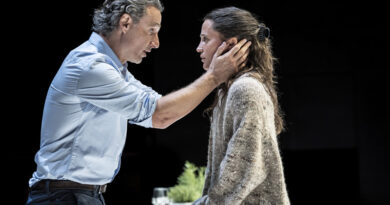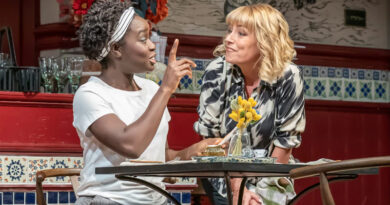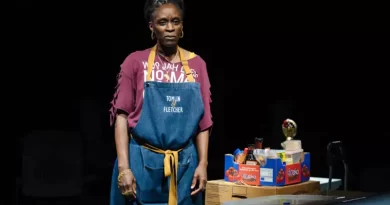“A Voyage Round My Father” at Theatre Royal Bath
Simon Thomas in Somerset
6 October 2023
It seems no time at all since Rupert Everett was appearing in the West End playing a public schoolboy in Julian Mitchell’s Another Country, alongside another young actor called Kenneth Branagh. The years have passed and now he is playing the blind and crusty old patriarch of John Mortimer’s A Voyage Round My Father and leaving it to a new generation to provide the youth. Passing on the baton, professionally and personally, is one of the themes of Mortimer’s play and it’s a neat touch having his daughter Rosie (sister of actress Emily) make her own short voyage around her father in the programme notes.
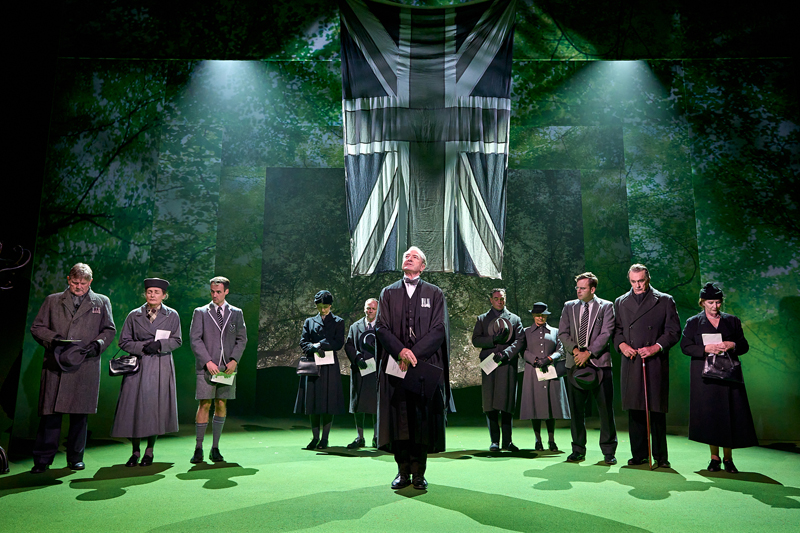
The company. Photo credit: Manuel Harlan.
The audience for this brief tour of Richard Eyre’s stylish revival, in towns such as Bath, Richmond, Chichester, and Malvern, might easily identify with the world Mortimer evokes. The 1963 play, which didn’t hit the West End until 1971, is only likely to be revived on such a circuit and doesn’t have much to appeal to younger audiences. It begins in 1920s Home Counties running through to the post-war era and for most people it will seem distant and old-fashioned.
What is recognizable to anyone who has had a father, though, is the depiction of the relationship between generations and the excruciating pain that can come from having an embarrassing parent (is there any other kind?). No matter what social class you’re from, you’re likely to appreciate the sort of discomfort that leads one young man in the play to disown his parents and claim he’s a refugee from the Russian Revolution.
What’s striking about Mortimer’s memoir is how deep is his love for a father who shows little return of affection and undermines his son at every opportunity. He turns up at the school assembly and toe-curlingly sings a different song from everyone else, as well as creating a predictably awkward moment when the young man brings a girl home. The love for the old man is unwavering despite the trials the retired barrister puts the boy through.
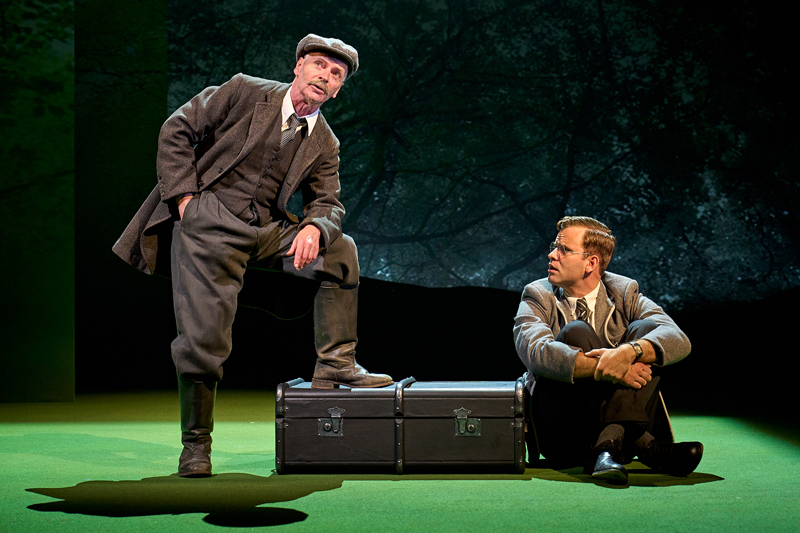
John Dougall and Jack Bardoe. Photo credit: Manuel Harlan.
Everett is the star attraction of the production but lacks the warmth that can make even the most eccentric parent relatable. Mortimer’s father may have been irascible, bullying, tyrannical even, but it’s important that there is something lovable somewhere within him. He may not be able to help it but Everett has an unfortunate sneer on his face throughout. He looks like an old man and sounds like an old man but doesn’t move like one. His performance does develop during the evening, perhaps because as he gets older and more immobile his physicality becomes less of an issue. Some sympathy for him comes with the diminishing of his powers and the inevitable decline that awaits even the strongest personality.
Budding authors are often advised to write about what they know and Mortimer certainly did that his whole career. Not only is this a heavily autobiographical reflection on his family relationships but, like so much of his other work, revolves around his first profession, the law. He’s best known of course for his series of books on Rumpole of the Bailey, and the spin-off TV series that ran for so long from the 1970s through to the 1990s. It’s a world he knew backwards and he mined it for all he was worth throughout his writing life.
Mortimer senior was a fearsome opponent in court and the play shows him at work demolishing those “agin” him as the son overcomes his father’s scorn and discouragement to bumble his way up the legal ladder. Along the way, we also see young Mortimer’s early attempts to write plays and a fairly disastrous foray into the world of wartime filmmaking.
Jack Bardoe as The Son drives the play through with panache, ageing effectively from a gawky kid to a middle-aged father and managing to look more and more like John Mortimer as he goes. The rest of the cast play multiple roles and it’s a particularly strong ensemble.
Julian Wadham is luxury casting and, as the headmaster, is very entertaining in his “birds and bees” chat, where he rambles on about dreams, stiff walks, and cold baths to the bewilderment of his young charges. John Dougall is a delight as a chirpy ex-jockey and a woebegotten junior teacher afflicted with similar problems to the outgoing King Edward VIII. Zena Carswell and Heather Bleasdale are great in their various roles, particularly the Misses Cox and Baker who run the local bookshop.
The long-suffering and self-sacrificing Mother, played by Eleanor David, seems a trifle clichéd but that’s how it’s written and was presumably how Mortimer’s mother was. In contrast, Allegra Marland is forthright and independent as the son’s new bride, daring to say the unsayable, breaking a family code that never acknowledges the old man’s blindness.
Mortimer was undoubtedly a great wordsmith and Eyre directs with a finesse that matches that of the writing but this is hardly demanding material for a director of his ilk. There’s a fine theatrical moment near the beginning of the play, when the Father loses his sight but for the most part the play and production drift along in gentle, elegiac vein.
Bob Crowley’s simple and adaptable set consists of diminishing screens in pastoral colours that underline the démodé feel of the piece. It’s a safe evening of theatre, a well-made play with flashes of humour and some touching moments.

